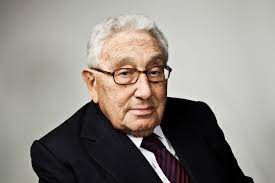
Henry Kissinger, the child refugee who rose to become US secretary of state and defined American foreign policy during the 1970s with his strategies to end the Vietnam War and broke down barriers with China has died. He died at 100.
Kissinger with his thick glasses and gravelly voice yet commanding presence exerted uncommon influence on global affairs under Presidents Richard Nixon and Gerald Ford.
This earned him both vilification and the Nobel Peace Prize. The 1973 Nobel Peace Prize that went to Kissinger and North Vietnam’s Le Duc Tho was one of the most controversial in the award’s history.
Two members of the Nobel committee resigned over the choice and Tho declined the prize on the grounds their work had not yet brought peace.
The Yale University don Greg Grandin, author of the biography Kissinger’s Shadow, estimates that Kissinger’s actions from 1969 through 1976,resulted in the death of between three and four million people.
Kissinger helped extend the Vietnam War, assist with genocides in Cambodia, East Timor, and Bangladesh, further escalating civil conflicts in southern Africa, and support coups and death squads across Latin America.
He was never indicted or convicted for any of his crimes, decades later, his name still evoked impassioned debate over foreign policy landmarks long past.
Born on May 27, 1923 in Furth, a city in Germany’s Bavarian region, Heinz Alfred Kissinger was an Orthodox Jew.
He was bullied by anti-Semites and in 1938 his family joined the exodus from Nazi Germany by moving to New York. He became a naturalised American in 1943.
Kissinger worked as a translator in intelligence operations and returned to his homeland during World War Two as a member of the U.S. Army’s 84th Infantry Division.
Following an impressive career on the Harvard University faculty, Kissinger joined Richard Nixon’s administration as national security adviser in 1969, a job he held after Nixon resigned and was succeeded as president by Gerald Ford. He also served as secretary of state under Nixon and Ford.
Kissinger had a hand in many epoch-changing global events of the 1970s, including the Vietnam War, the diplomatic opening of China, landmark U.S.-Soviet arms control deals and expanded ties between Arab nations and Israel.





